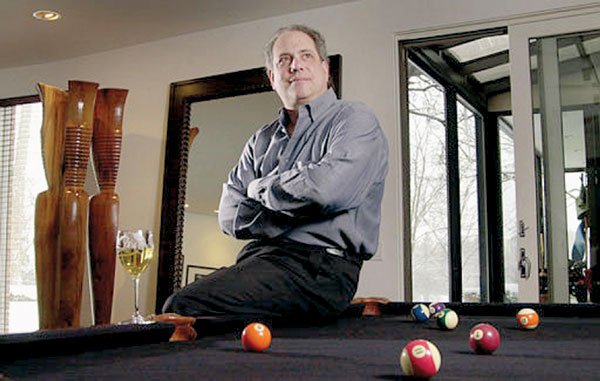My southeastern Ohio grandmother, Alice Chatfield, used to have
a saying she would apply whenever she heard that someone of means
acquired a new piece of property:
”
Thems that has, gets,
”
she would say while nodding her head vigorously.
My southeastern Ohio grandmother, Alice Chatfield, used to have a saying she would apply whenever she heard that someone of means acquired a new piece of property: “Thems that has, gets,” she would say while nodding her head vigorously.
Grandma’s grammar notwithstanding, that little bit of homespun wisdom has a great deal of truth in it. As a person who never really had a lot of money or possessions, Grandma Alice had, I suppose, a subliminal envy of those who did. She and my grandfather John – a couple who raised nine children during the Great Depression – also had a deep-seated distrust of large companies and corporations. Grandpa railed about the cost of food a lot. He had a particular thing about condiments such as ketchup, mustard and pancake syrup. “It’s those #@%! condiments (pronounced “KIND-ee-mints) that are drivin’ up the cost of food today,” he would complain.
I think my grandparents would really hate the modern business plan adopted by many companies of basically being clearinghouses for brand names. These companies are actually holding companies, businesses that don’t really make anything, but instead acquire and oversee others that do. I guess this is a logical evolution of a nation that has basically dismantled its once-mighty industrial backbone and has morphed itself into a “service economy.”
“So, Mikey,” you’re probably thinking about now, “that’s all fine and good, but just what does all this have to do with wine?” Glad you asked, glad you asked.
Earlier this week, a company called Constellation Brands, Inc. (listed on the New York Stock Exchange as STZ and as of this writing, valued at $38.97 per share) announced that it has tendered an offer to acquire the Robert Mondavi Corporation, the company started by the guy who for many epitomizes the heart and soul of the Napa Valley wine industry. It’s an all-cash offer of around $1.3 billion dollars, and it represents a 37-percent premium over the price that Mondavi stock closed at on the day of the offer. Quite a deal, if you’re a Mondavi shareholder.
But the story got me to thinking about who really owns what in the wine world. As I’ve done stories about wineries for this and other publications, winemakers will occasionally tell me that they’ve been bought out by such-and-such corporation. Invariably in this situation, the person will ask that this fact be either downplayed or left out of my story altogether. Why? It would put their customers off, knowing that the earthy, homey, handcrafted image that many winemakers have portrayed over the years is actually a front for a big mega-corporate structure.
Constellation, based in Fairport, New York, is a major player in the adult beverage marketplace. The company is divided into three divisions: Canandaigua Wine, North Lake Wines and Pacific Wine Partners. The Canandaigua brand portfolio includes more than 22 labels that together produce in excess of 30 million cases each year. Some of its better-known brands are Almaden, Inglenook, Talus, Manischewitz and Arbor Mist.
North Lake Wines claims that by volume it is among the world’s top 10 wine companies. Its brands include Paul Masson, Taylor and Italian Swiss Colony. Pacific Wine Partners concentrates on “super-premium” California brands such as Blackstone and Seventh Moon, and also imports Australian wines Hardys, Banrock Station and Barossa Valley Estate.
All together, Constellation is the largest producer and marketer of wine in the world, and the second-largest in the United States. In addition to wine, they’re big in beer. The Barton division controls the Corona, St. Pauli Girl and Tsingtao brands and is the largest importer of suds in 25 (mainly Western) states. Now that will change your latitude.
There are other brand-collecting companies like Constellation. Fortune Brands is another whopper. Fortune is more diversified, with four divisions: Home and Hardware (Moen faucets, Master Lock “Tough Under Fire!” padlocks and MasterBrand kitchen cabinets); Golf (Titleist, FootJoy, Pinnacle and Cobra); Office (Kensington, Swingline and Day-Timer); and by far their biggest division, Spirits and Wine. This sub-group contains lots of names you know, and many that directly (and fiercely) compete against each other in the marketplace.
Distilled beverage brands owned by Fortune include Jim Beam, Old Grand-Dad, Old Crow, Old Overholt (they evidently like the word “old”), Knob Creek, Kessler, Calvert, Lord Calvert and the Dalmore whiskies, VOX, Wolfschmidt and Gilbey’s vodka, Gilbey’s gin, Ronrico rum and DeKuyper cordials. The wine labels they control are Geyser Peak, Canyon Road and Wild Horse.
Another beverage giant, Pernod Ricard, controls dozens of familiar names like Chivas, Jameson, the Glenlivet, Martell, Jacob’s Creek, Wyndham Estate, Dubonnet and Sandeman.
So while it might appear that the single-owner, mom-and-pop winery is fast disappearing, we probably won’t know about it when it does. One thing these companies are is market-savvy, and they are smart enough to know that consumers respond to the notion that the wine they drink is hand-made in small batches by a guy with grape-stained hands and a love for his craft. And for the most part, when a big company buys a winery, the wines are still made that way.
I’m not sure what Grandma Alice would think about all this, but I can see her sitting in her kitchen (the one with the carefully hidden KIND-ee-mints), sipping coffee (she was a teetotaler) and saying “See? Thems that has, gets!”














